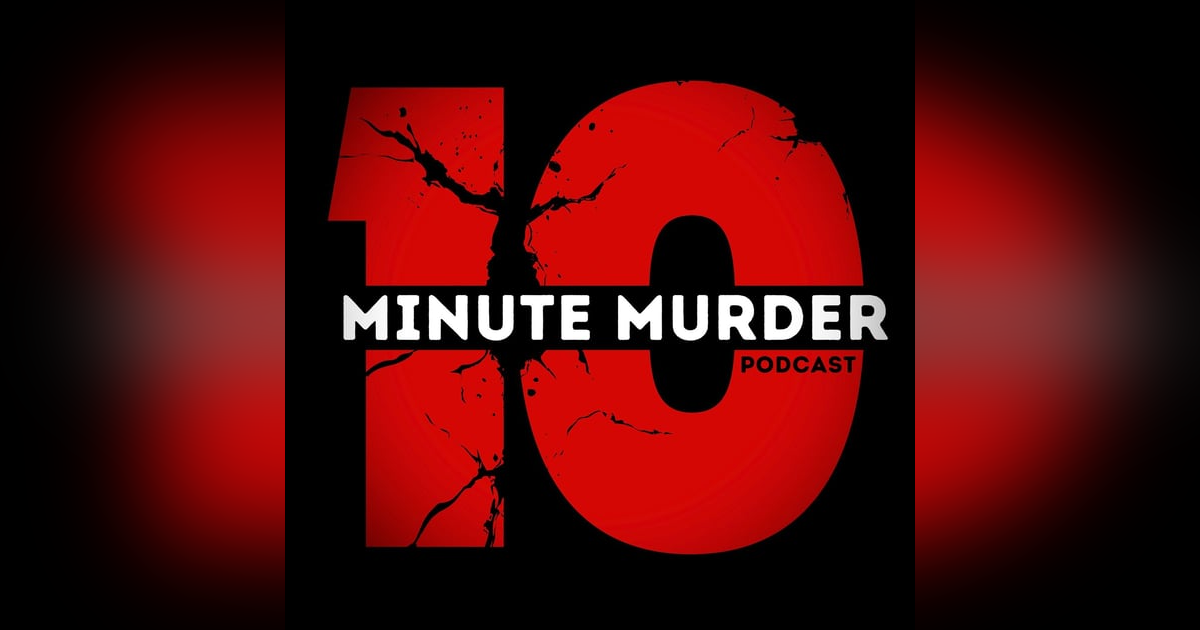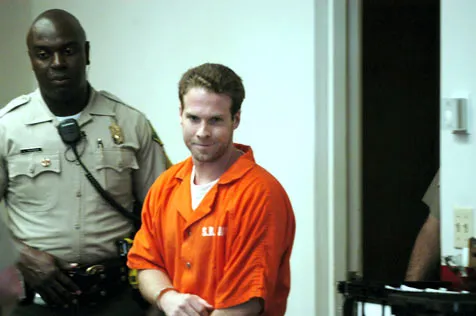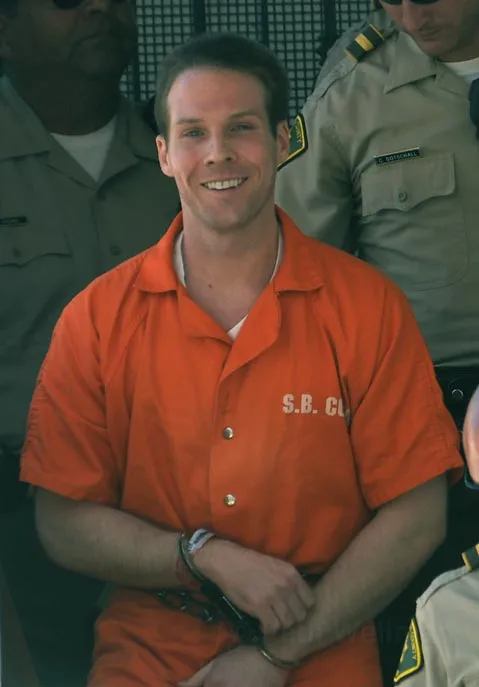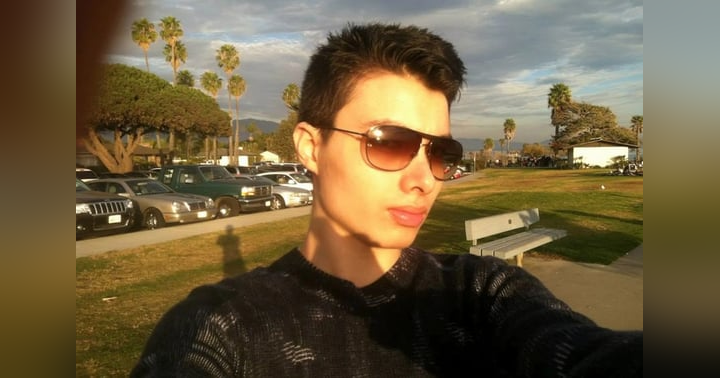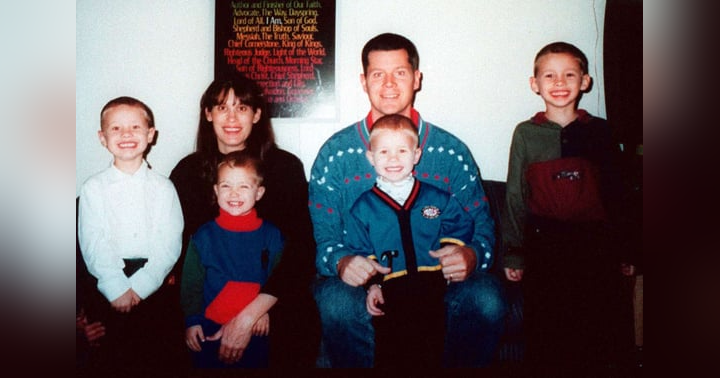Jesse James Hollywood: The Killer Who Inspired Alpha Dog

Jesse James Hollywood: From Suburban Privilege to Something Much Darker
In the early 2000s, Jesse James Hollywood was living like the lead in a teen drama. San Fernando Valley. Los Angeles. Private school. Well-off parents. He had money, grades, friends, and a name that sounded like it was made for a movie poster.
Everything in Jesse’s life came easy—nice things, social status, the kind of confidence that only seems to exist in zip codes with gates.
Then he hit his teenage years and took a sharp detour.
He stopped caring about school and shifted his focus to the gym. Jesse had always been athletic—he’d done well in baseball—but now he was chasing something more extreme. Powerlifting. Bodybuilding. Supplements. The whole “bigger is better” spiral.
That shift came with a personality change too. He got volatile. Angry. And eventually violent—bad enough that he assaulted a teacher and got himself expelled.
That should’ve been a wake-up call. And for a minute, it almost was. Jesse switched schools, dropped the weights, picked baseball back up. But then came an injury that benched him for good.
No sports. No school. No real direction.
What came next was a hard left into something more profitable and a lot more illegal.
There were later charges—ones that never stuck—against Jesse’s father that suggested the Hollywood family wasn’t exactly unfamiliar with narcotics. Jesse, for his part, started selling.
And his customers? Mostly the same rich kids he’d grown up with. Kids who didn’t need money, but liked the thrill. Jesse took their cash, gave them product, and slowly built a little crew of loyal hangers-on.
When they weren’t buying from him, they were doing favors for him. Some dumb. Some dangerous. And all of it was just starting to spin out.
The $35,000 Debt That Pulled a Kid Into a Deadly Game
Jesse James Hollywood had a long memory, especially when it came to money. And $35,000 wasn’t the kind of debt he was going to let slide—even if the guy who owed it to him used to be one of his best friends.
Benjamin Markowitz and Jesse had history. They played on the same junior baseball team, trained at the same gym, probably knew each other’s moms. But that was a long time ago. Now, Benjamin was deep in Jesse’s drug operation and even deeper in debt.
And Jesse had reached his limit.
He wanted to send a message. Not a phone call. Not a threat. Something physical. Something that would shake Ben up and force him to pay attention—maybe even scare him into coughing up the money.
At the time, Benjamin was still living at home with his parents and his little brother, Nicholas. Just a regular suburban setup in the same part of L.A. where Jesse had built his little empire. Tight-knit neighborhoods. Familiar faces. The kind of place where someone walking by might stop and say, “Tell your mom I said hi.”
But Jesse wasn’t stopping to say hi.
He and his crew loaded into a van—white, with a sliding door—straight out of a bad movie. The plan? Find Ben. Grab him off the street. Let him know, in no uncertain terms, that Jesse meant business.
But Jesse didn’t see Benjamin first.
He saw Nicholas.
Fifteen years old. Just a kid. Maybe heading to a friend’s house. Maybe just walking to get some air. Either way, he was in the wrong place at the worst possible time.
In that moment, Jesse made a snap decision that would shape everything that followed.
To him, it didn’t matter which Markowitz ended up in the van. Nicholas would send the same message. Maybe louder. Maybe clearer.
Jesse told his guys to pull over.
Nicholas noticed. Something about the van, or maybe the way it slowed down, or the faces inside—whatever it was, he ran. He ran like a kid who knew exactly what kind of danger he was in.
But they chased him. Outnumbered him. Beat him until he couldn’t run anymore.
And then they threw him into the van.
Not just kidnapped—but taken by people who used to be in his house. People who used to eat snacks from his kitchen. The same ones who probably high-fived his brother after baseball games.
That kind of betrayal doesn’t feel dangerous at first. It just feels confusing. So when things calmed down, some kind of uneasy peace settled in. Jesse’s gang didn’t tie Nicholas up or throw him in a basement. They didn’t treat him like a hostage. Not yet.
They’d taken him. But for now, it looked like they were trying to play it cool.
And that’s when things got really dangerous.
Three Days, One Terrified Teenager, and a Decision That Sealed His Fate
What happened next was the kind of chaos that doesn’t look like chaos—at least not right away. Nicholas Markowitz, just 15, ended up spending three days with the same crew that had beaten him and thrown him into a van.
But somewhere in that mess, the energy shifted. Maybe they got him drunk. Maybe they gave him something stronger. Maybe they convinced him it was all just for show—that no one was really going to get hurt.
Or maybe, for those three days, Jesse hadn’t actually made up his mind yet.
Whatever the reason, Nicholas stayed. He drank with them. He partied. Other people saw him—friends, even parents. People who might’ve been able to say, “This doesn’t feel right.” But no one stepped in. Or if they did notice, they didn’t do much about it.
And Jesse? He gave it just enough time to feel like things were settling. Then, on August 9, 2000, he told the crew Nicholas was going home.
Naturally, they threw a party to celebrate.
One more night of drinks and bravado before Nicholas would supposedly be dropped off safe and sound. Message delivered. Debt reminder complete. Jesse had made his point, right?
But something was gnawing at him.
Nicholas wasn’t just a teenager who’d been scared. He was a minor. A kidnapped minor who’d been drugged, given alcohol, and passed around from house to house by a bunch of 20-year-old dealers. Jesse had crossed more than one legal line—and now he had a witness.
So while everyone else partied, Jesse stepped outside and made a phone call—not to Nicholas’ family, not to Ben, but to his lawyer.
The advice was blunt: kidnapping could get you life in prison. Period.
And just like that, Jesse’s brain started working again—only this time, it wasn’t about sending a message. It was about survival.
Ben wouldn’t go to the cops—he couldn’t. He was buying drugs, and he knew Jesse had dirt on him. But Nicholas? Nicholas had no reason to stay quiet. He was clean. Innocent. And now, a liability.
So Jesse made another call. This one to Ryan Hoyt, a gang member who also happened to owe him money.
Jesse offered to wipe the debt clean. All Ryan had to do was “handle” the Nicholas situation.
Ryan agreed.
(Ryan Hoyt)
That night, the group loaded into the van. But instead of heading to Nicholas’ house, they drove out to the Santa Ynez Mountains. Somewhere remote. Quiet. Already prepped with a shallow grave.
Nicholas was told to get out. He must’ve realized what was about to happen. You don’t stand next to a grave and think you’re being dropped off. He pleaded. He begged. They taped his mouth shut and hit him over the head with a shovel.
He fell into the grave. Ryan shot him nine times.
Four days later, Nicholas’ body was found.
And because Jesse and his crew had paraded him around town, taken him to parties, let people see his face—they weren’t exactly hard to track down.
Four gang members were arrested almost immediately. Ryan Hoyt among them. But Jesse? He was already gone.
He’d skipped town, made his way to Brazil, and moved in with his godfather—who, according to reports, had no idea Jesse was now wanted for murder.
Jesse reinvented himself. Learned Portuguese. Changed his name. Got a woman pregnant. He believed that having a child in Brazil might shield him from extradition.
It didn’t.
Shortly before his son was born, Jesse was arrested while heading to a mall to meet a cousin.
Back in the States, the rest of his crew had already served five years by the time Jesse’s trial began. It lasted weeks. The jury took three days to deliberate. Ryan Hoyt had already been sentenced to death, though that would eventually be commuted to life in 2024.
Now, it was Jesse’s turn.
He was found guilty of first-degree murder and kidnapping.
Life in prison. No possibility of parole.
